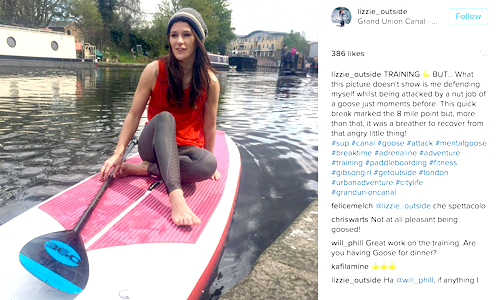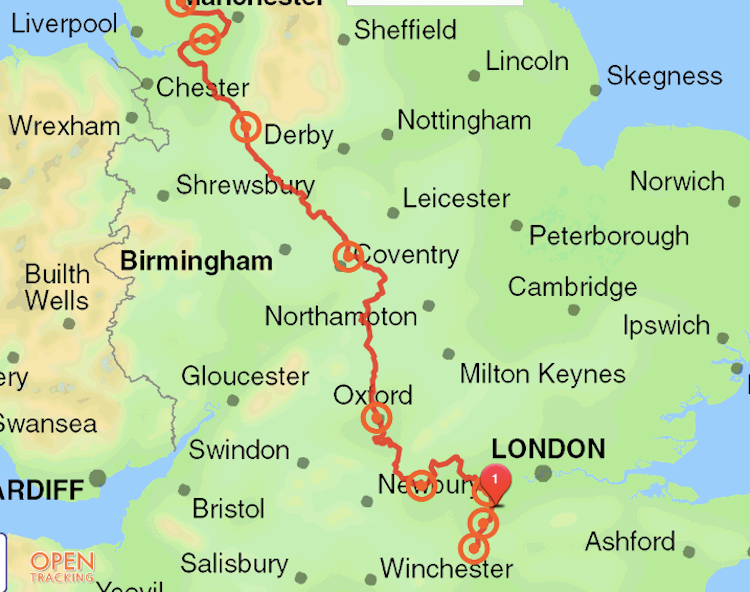

Lizzie Carr, an adventurer and environmentalist based in the UK, has set off on a three-week, 400 mile journey with only her stand up paddleboard and 30kg of supplies to bring awareness to plastic pollution.
[instagram https://instagram.com/p/BFEY1P3RRWE expand=1]
According to The Guardian, she set off from the most southern point of the UK’s connected waterways, the river Wey in Surrey on Wednesday. She will then travel north through Oxford, Coventry, the Stoke on Trent canal, the Douglas and Ribble rivers in Lancashire and finish just south of Kendal, Cumbria. Along the way, she will travel through 193 locks and 8km of tunnels and aqueducts standing over 25ft above the ground.
With the help of Ordnance Survey, the national mapping agency for Great Britain, Carr will also map out the scale of plastic pollution in England’s iconic canals and waterways.
If she successfully completes the epic trip, she’ll be the first person to paddleboard the length of England via its connected waterways.

“I started paddleboarding a while ago in the Isles of Scilly, Portugal and Barbados,” Carr told the Guardian while on her board. “I came back to London and found you could do it in canals and cities, but the more I was doing it the more I saw plastic pollution and debris in the water. It was really sad and when you’re trying to board and you get plastic bags stuck on your fins it really compromises the whole experience.
“There are so many layers to the problem of plastic pollution but for me this is about raising awareness and getting people to think about when they buy something that is plastic, what use they will get out of it.
“That meant quitting my stressful corporate job to spend more time with the people I loved rather than confined within the office walls. But, above all, it meant getting outside and back in nature—not just for the obvious health benefits—but because it was the place I felt happiest. I wanted to live a more balanced life, regaining strength by pushing my mental and physical limits and, rather than letting the experience claim me, use it to create a life that I dreamt of.”
Carr, who only tried SUP for the first time two years ago, has now paddled on rivers and oceans around the world. She was also selected as a champion for Ordnance Survey’s “Get Outside” campaign to encourage people to explore the UK.
“Paddle boarding the length of the country is a great way to show its natural beauty from an altogether different perspective—the water,” Carr told Science Focus. “Our canals are iconic pieces of history that provide a presence of calm and tranquillity in urban settings.
“They are easily accessible all over the country they are currently under threat from plastic pollution and debris that, if we don’t address soon, will compromise the beauty and quality of our experiences along the canals.”
[instagram https://instagram.com/p/BFM3O3GRRVP expand=1]
Plastic litter has infiltrated many of the UK’s bodies of water. Research from the University of London found that nine out of 10 flounder and a fifth of smelt swimming in the Thames river had plastic in their guts. The researchers also found giant knots of plastic fibers in the stomachs of Chinese mitten crabs at Chelsea Bridge.
The Canal and River Trust, which manages the navigable waterways of England and Wales, spends nearly £1 million a year on clean up efforts.
“Plastic in our water is a serious issue currently under government review,” Nick Giles, managing director for Ordnance Survey Leisure, told Science Focus. “It’s also an issue Ordnance Survey’s recent Geovation Challenge highlighted. Lizzie is an OS Champion for a good reason, and what she is doing demonstrates how we have a beautiful country to be enjoyed, but it also stresses how much it and the creatures that live in it need protecting.”
[instagram https://instagram.com/p/BE_SmRmRRbj expand=1]
Not only is plastic a problem in waterways, a research team at King’s College in London is also looking into the very “real possibility” that microplastics particles are polluting the air.
Carr, who has been in remission from cancer for the past two years, is “deeply in love” with her life.
“It’s been scary, difficult, exhausting but quitting my job and shaking up my life has been the best decision I ever made,” she wrote on her bio page. “I’m extremely grateful for my experience and the new sense of perspective it’s given me.”
Carr’s challenge will be tracked on her website as well as on the Ordnance Survey’s website. You can also follow her journey on her Twitter and Instagram.
[instagram https://instagram.com/p/BFSBw_bxRfU
YOU MIGHT ALSO LIKE
Scientists Warn That You Could Be Inhaling Chemically-Laden Microplastic Particles
5 Reasons Why You Should Think Twice Before Jumping Into Your Local River
Great Barrier Reef Could Be Dead in 20 Years
Duke Study: Rivers Contaminated With Radium and Lead From Thousands of Fracking Wastewater Spills

 233k
233k  41k
41k  Subscribe
Subscribe 